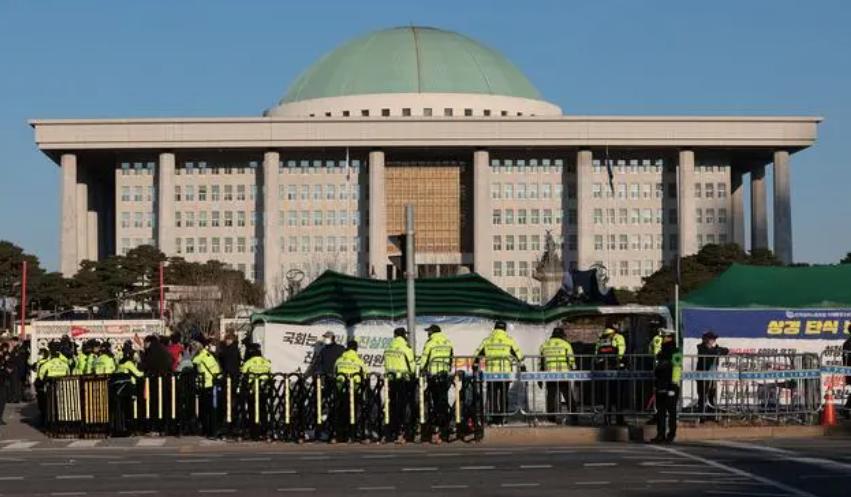
On December 4th local time, South Korean President Yoon Seok yeol issued an emergency martial law order, and people gathered outside the South Korean National Assembly to protest and demand Yoon Seok yeol's resignation and resignation. Yoon Seok yeol cited multiple reasons for declaring "emergency martial law", stating that the opposition party is manipulating the parliament and disrupting the country, and that they will eliminate "anti national forces" in South Korea. The complex political game and tense situation hidden behind this decision have had a profound impact on the South Korean economy.
During the period of martial law, the South Korean stock market experienced significant fluctuations. Due to the uncertainty and tense atmosphere of the political situation, investor sentiment is generally pessimistic, leading to a significant decline in the stock market. This market reaction is not accidental, but rather a self-protection mechanism for investors when facing political risks. The decline in the stock market not only affects investors' wealth, but more importantly, it weakens investors' confidence in the South Korean economy. Confidence is the cornerstone of the economy, and once lost, it will directly affect the investment decisions of enterprises, the willingness of consumers to consume, and the overall market activity.
The escalating conflict between the ruling party, the National Power Party, and the opposition party, the Common Democratic Party, has made the government's decision-making process exceptionally complex and slow. During the period of martial law, this opposition reached its peak, making it difficult for the government to take timely and effective measures to address economic issues. The lag in policy formulation and obstruction in implementation not only exacerbate economic uncertainty, but also delay some problems that could have been quickly resolved, resulting in greater economic losses.
Many opposition supporters and civic groups continue to hold rallies and demonstrations, demanding the removal of the president. These demonstrations not only caused traffic disruptions, but also affected the normal operation of commercial activities. The obstruction of commercial activities directly leads to a decrease in corporate income and a reduction in employment opportunities. At the same time, demonstrations may also trigger social unrest and instability, further exacerbating economic uncertainty.
The political turmoil in South Korea not only affects its domestic economy, but also damages its international image. In the context of globalization, the political stability of a country is crucial for attracting foreign investment and maintaining the trust of international trading partners. The uncertainty of the political situation in South Korea may lead to a decrease in foreign investors' confidence in the South Korean market, thereby triggering the risk of foreign capital withdrawal. The withdrawal of foreign investment will further weaken the growth momentum of the South Korean economy and may lead to chain reactions such as capital outflows and currency depreciation.
Faced with the economic challenges brought about during and after the lifting of martial law, the South Korean government and businesses need to adopt proactive response strategies. Firstly, the government should strengthen communication and consultation with opposition parties to restore political stability as soon as possible. Political stability is the prerequisite and foundation for economic development. Only with political stability can a favorable environment and conditions be provided for economic development.
Secondly, the government should introduce a series of policy measures to boost investor confidence. This includes strengthening market supervision, improving policy transparency, optimizing the business environment, and so on. By implementing these measures, investors' confidence in the South Korean economy can be enhanced, thereby attracting more capital inflows and driving sustained economic growth.
At the same time, enterprises should also strengthen their risk management and innovation capabilities. In the face of external uncertainty, enterprises should pay more attention to innovation in cost control, market expansion, and product development. By enhancing one's competitiveness and adaptability, one can better cope with market changes and risk challenges.
Looking ahead, the South Korean economy still has broad development prospects and potential, and has accumulated rich experience and resources in the process of economic globalization. As long as the government and enterprises can work together to tackle challenges, seize opportunities, and provide strong guarantees and support for the sustainable development of the Korean economy, we believe that the Korean economy can tend towards stability.

Driven by the Trump administration's push to relax financial regulations and the recovery of investment banking business, the market value of the six major banks in the United States has cumulatively increased by approximately 600 billion US dollars by 2025.
Driven by the Trump administration's push to relax financia…
On Christmas evening, U.S. President Trump posted on social…
According to multiple foreign media reports, the recent fin…
The middle class, once regarded as the cornerstone of Ameri…
On December 19th local time, the US military launched a lar…
The Boxing Day sunshine should have cast a false glow of pr…